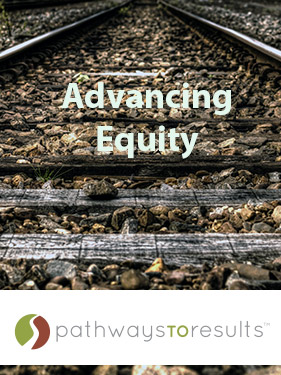As the third largest community college system in the nation with 48 community colleges in 39 districts, Illinois community colleges serve 65% of Illinoisans enrolled in the state’s public higher education institutions (Illinois Community College Board, 2017). Since 2009, Pathways to Results (PTR), an outcomes-focused, equity-guided process to improve programs and policies that support student transition to and through postsecondary education into employment, has been applied to projects across diverse Illinois community college contexts. The PTR model has evolved to include opportunities for institutions to apply for selection to participate in a second year that provides support for implementing and evaluating change to advance equity in programs and pathways.
Rend Lake College, located in rural southern Illinois, has an extensive history of PTR participation taking part in at least one project almost every year since 2011. Prairie State College, located just outside of Chicago, recently participated in the second year of PTR for the first time. Within these different institutional contexts, PTR has supported teams in building campus cultures that use data to identify inequities and engage stakeholders in implementing and evaluating change.
At Rend Lake College, PTR projects have grown over time, getting bigger in scope and engaging more and more people. Over the course of five separate projects, approximately 50 different people including faculty, staff, and administrators from not only the college, but also district high schools and the Regional Office of Education, have been engaged in the PTR process. That’s 50 people who actively participated in reviewing data and engaged in discussions centered on equity. That’s 50 people with a working knowledge of the PTR model gaining an understanding of the need to provide equitable solutions for students. Without a doubt, the PTR model has helped to change the way performance data is reviewed and improvement strategies are applied. Given the value of the model, it has been applied informally to projects throughout the college.
For Prairie State College, participation in the second year of the PTR process has focused on advancing equity in the dental hygiene program. Over the past several years, this particular program has not reflected the diversity of the institution. As the team explored the program’s application process and identified inequities for in-district students, team meetings provided opportunities to engage in further evaluation of data as well as discuss changes to the application process that advance equity and maintain high standards that set students up to be successful once admitted. The PTR process, which includes evaluation of proposed changes, supported the team in multiple iterations of revisions to the application process. Over the course of the project, this has resulted in stronger alignment with other allied health programs in the college. While it will take several years of data to determine the success of the changes, the newest class of accepted students shows promising results as it includes a higher percentage of in-district students than in the past.
Rend Lake College has found that the observable positive results of PTR projects evidenced over time has been a motivator to move people away from making assumptions to using data and analysis to implement equity-driven change. For Prairie State College, obtaining accurate and relevant data, as well as thorough and continuing analysis has been key to implementing promising changes to advance equitable outcomes. The PTR model of engaging stakeholders, disaggregating data, reviewing institutional processes and practices, and evaluating change has demonstrated value across these diverse institutional contexts.
Reference
- Illinois Community College Board (2017). Illinois community college system.
